Resume
Medical Director Cover Letter Examples

May 29, 2025
|
12 min read
Craft your perfect medical director cover letter with ease—diagnose key elements for success, prescribe tailored language, and ensure your application is the cure for landing an interview in the competitive healthcare landscape.
4.70 Average rating
Rated by 348 people
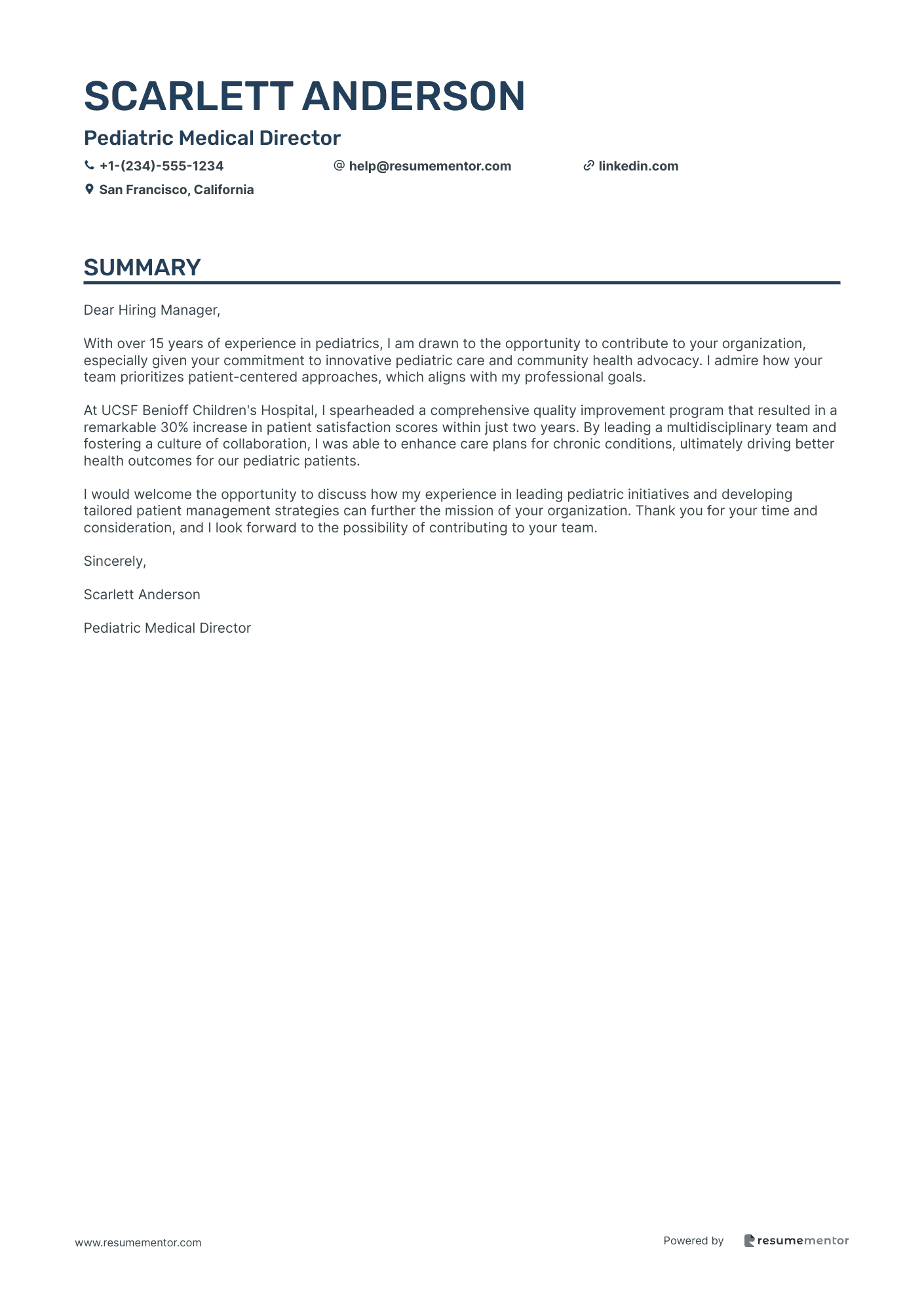
Pediatric Medical Director
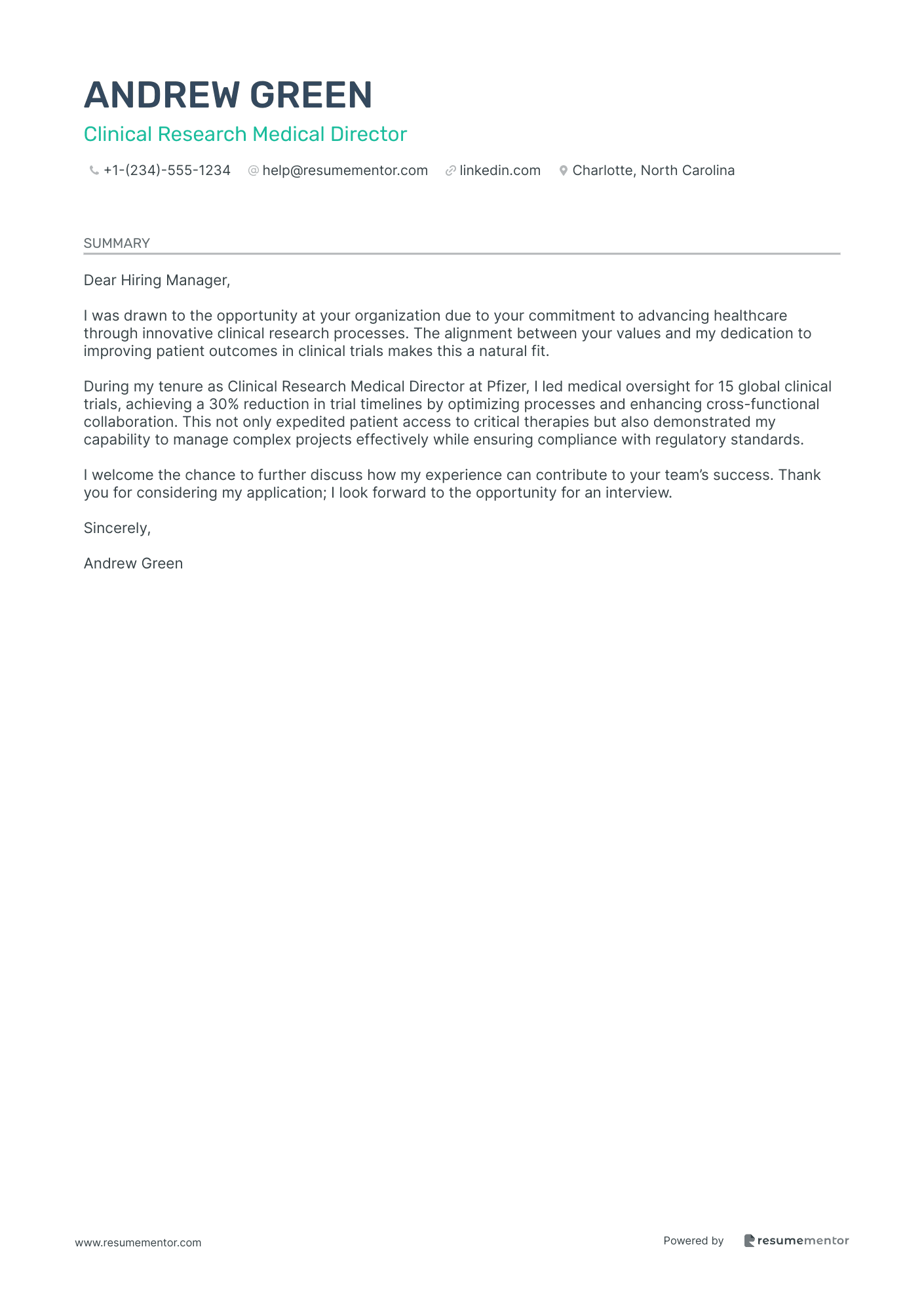
Clinical Research Medical Director
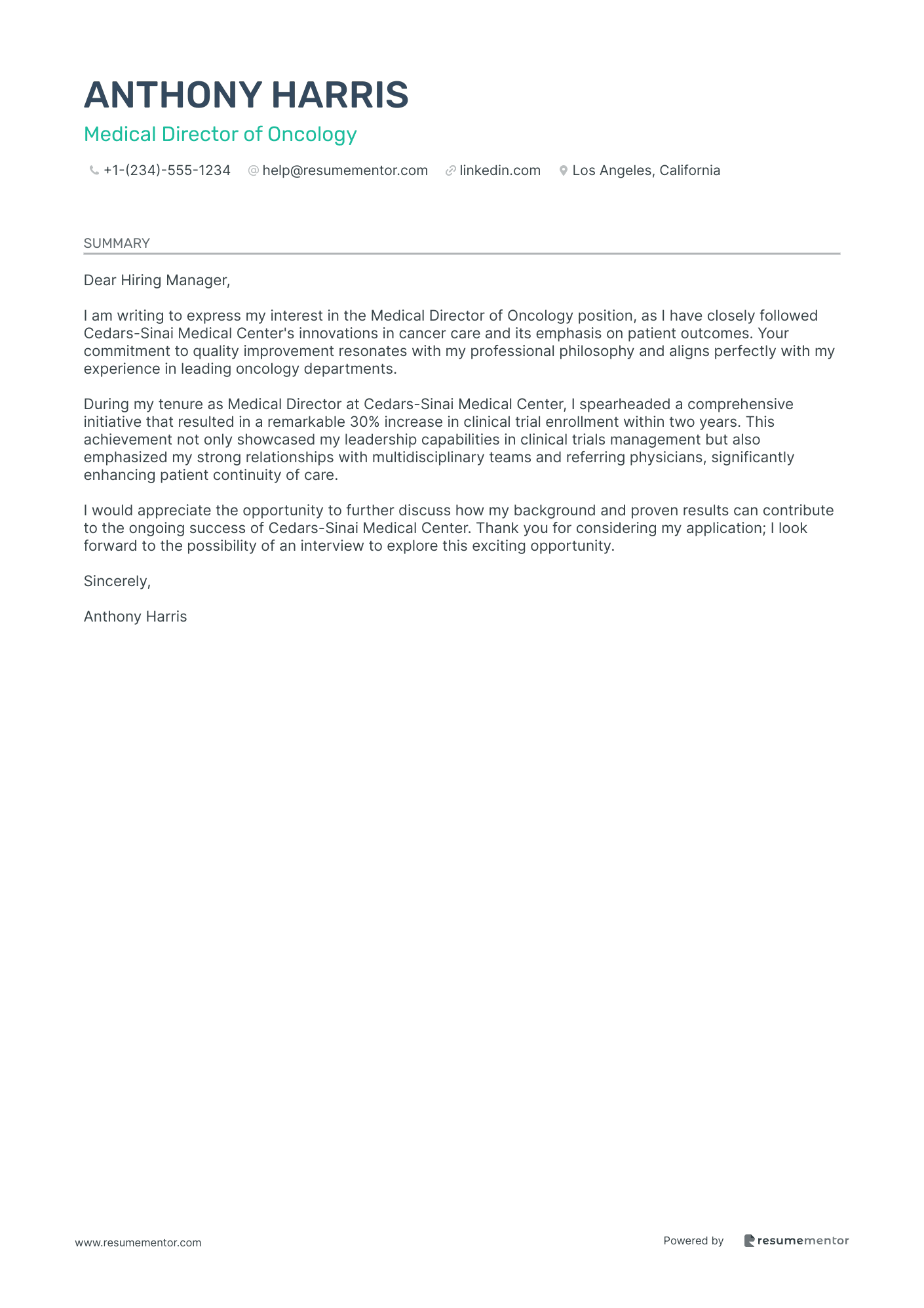
Medical Director of Oncology
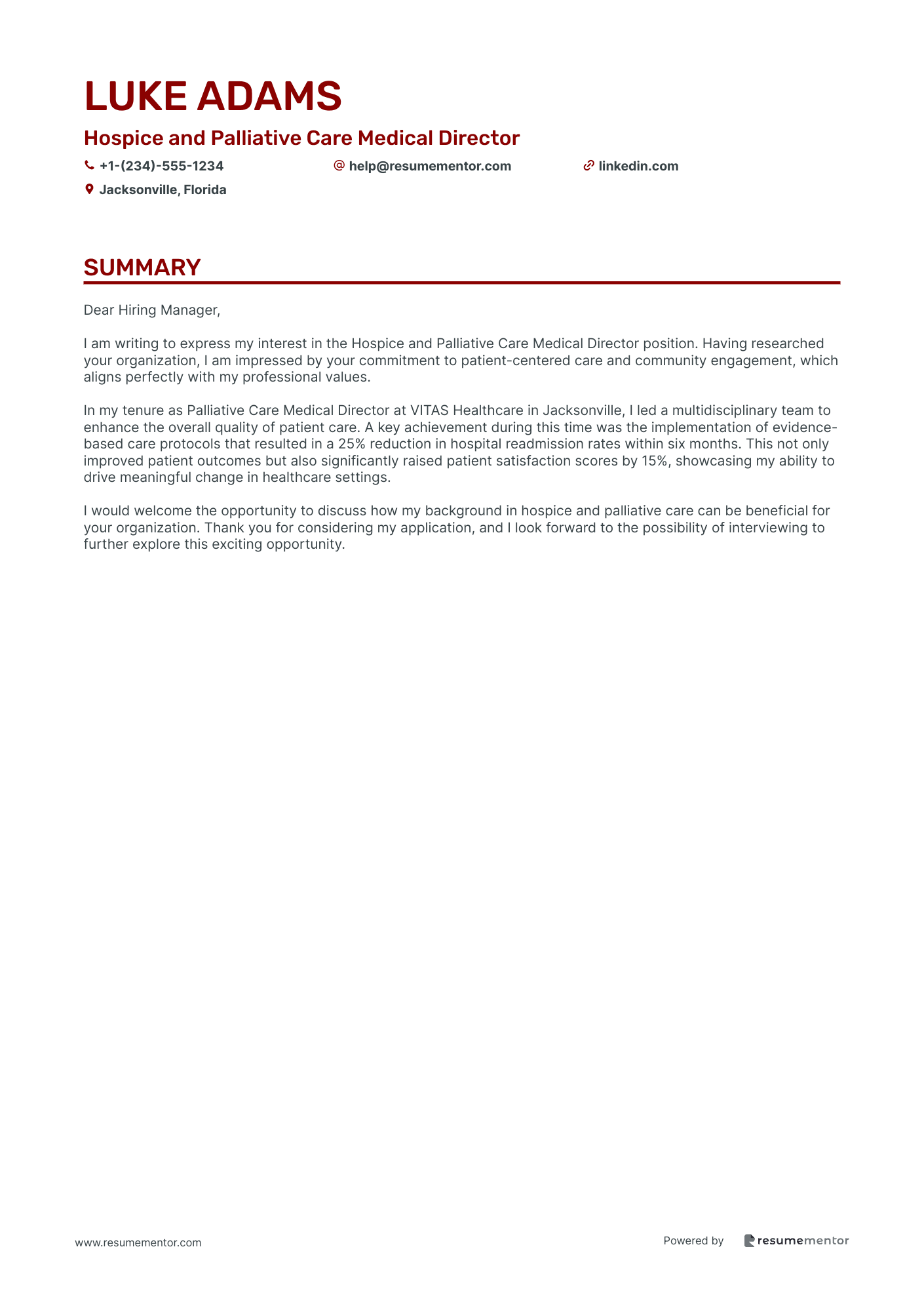
Hospice and Palliative Care Medical Director
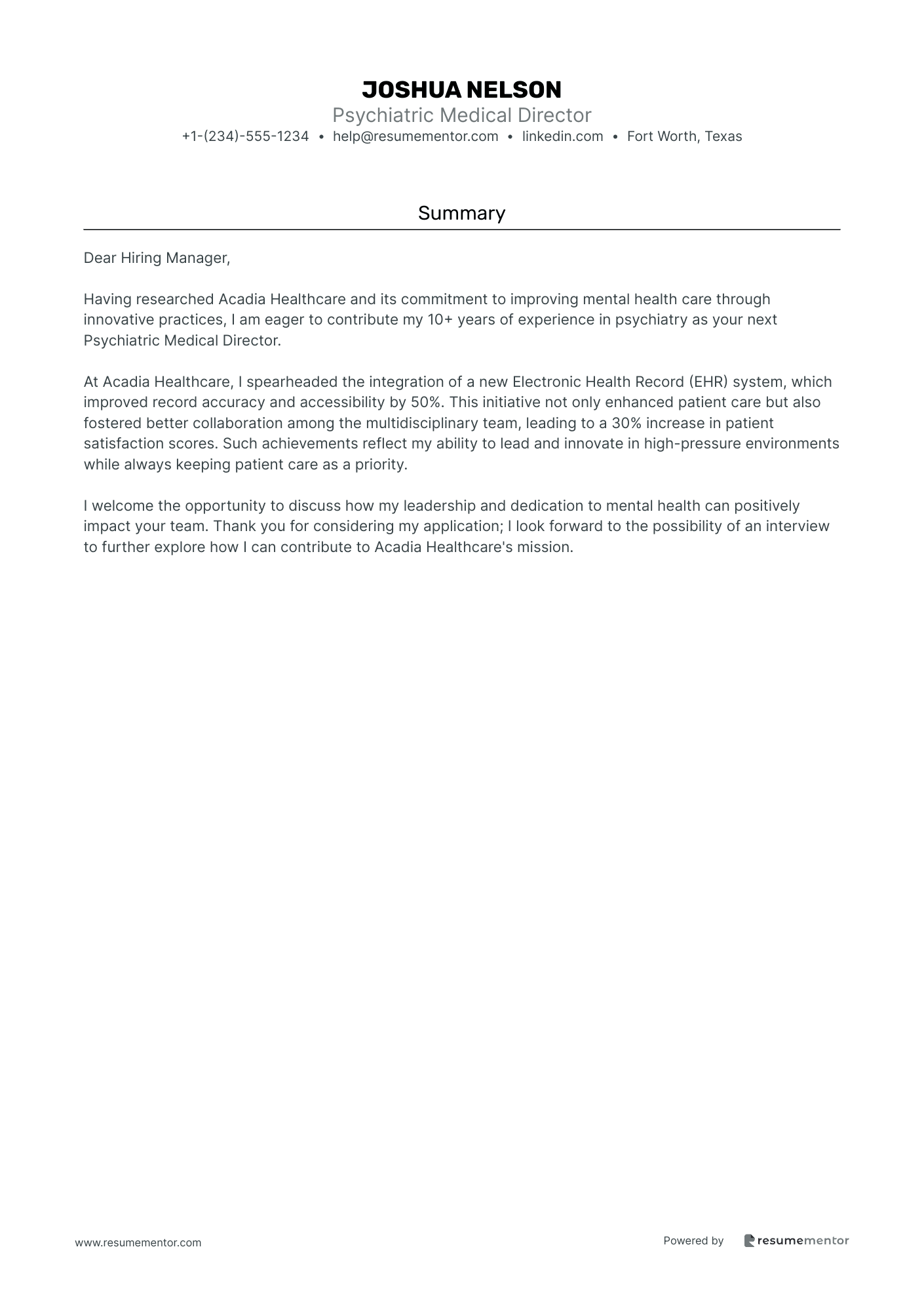
Psychiatric Medical Director
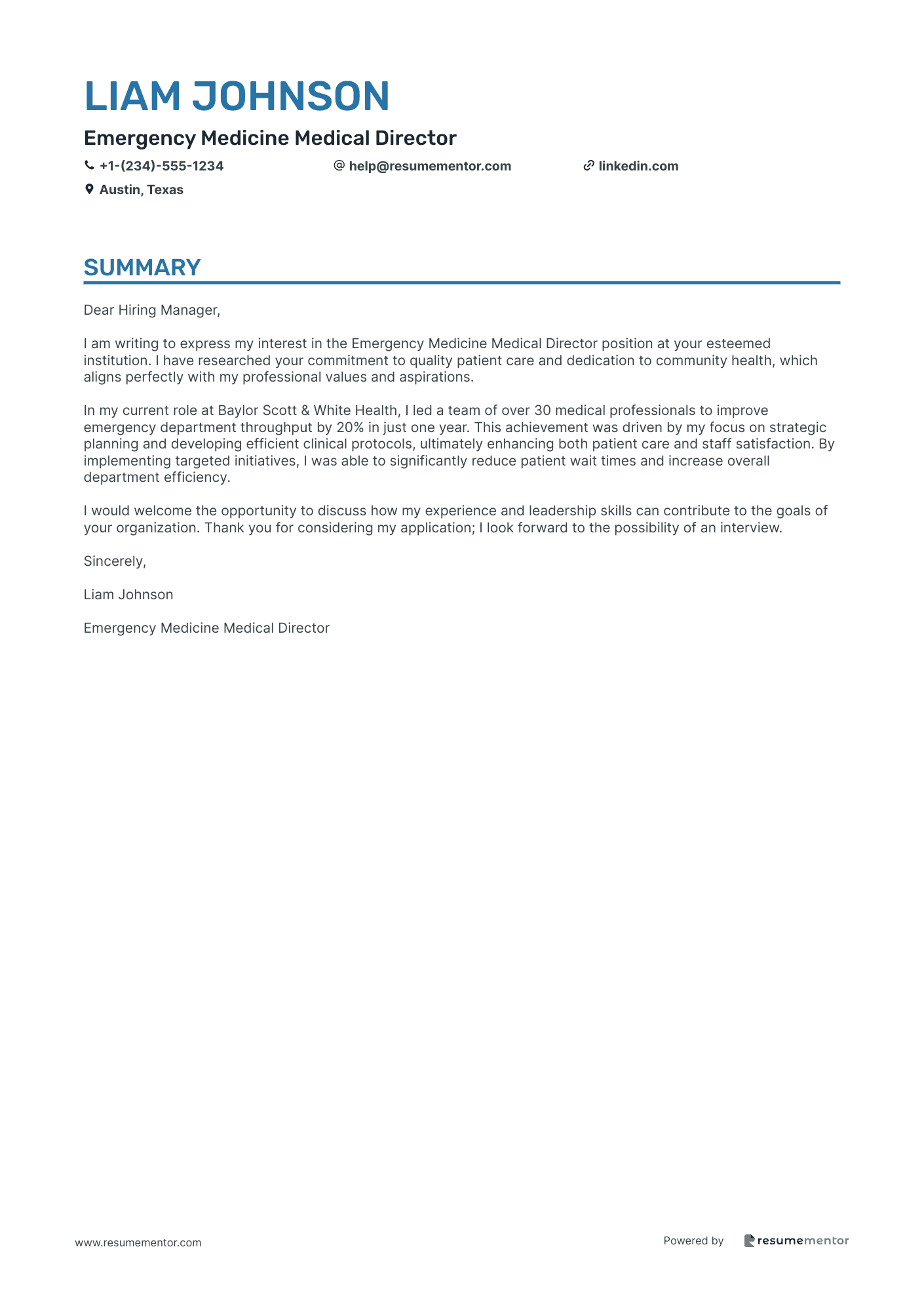
Emergency Medicine Medical Director
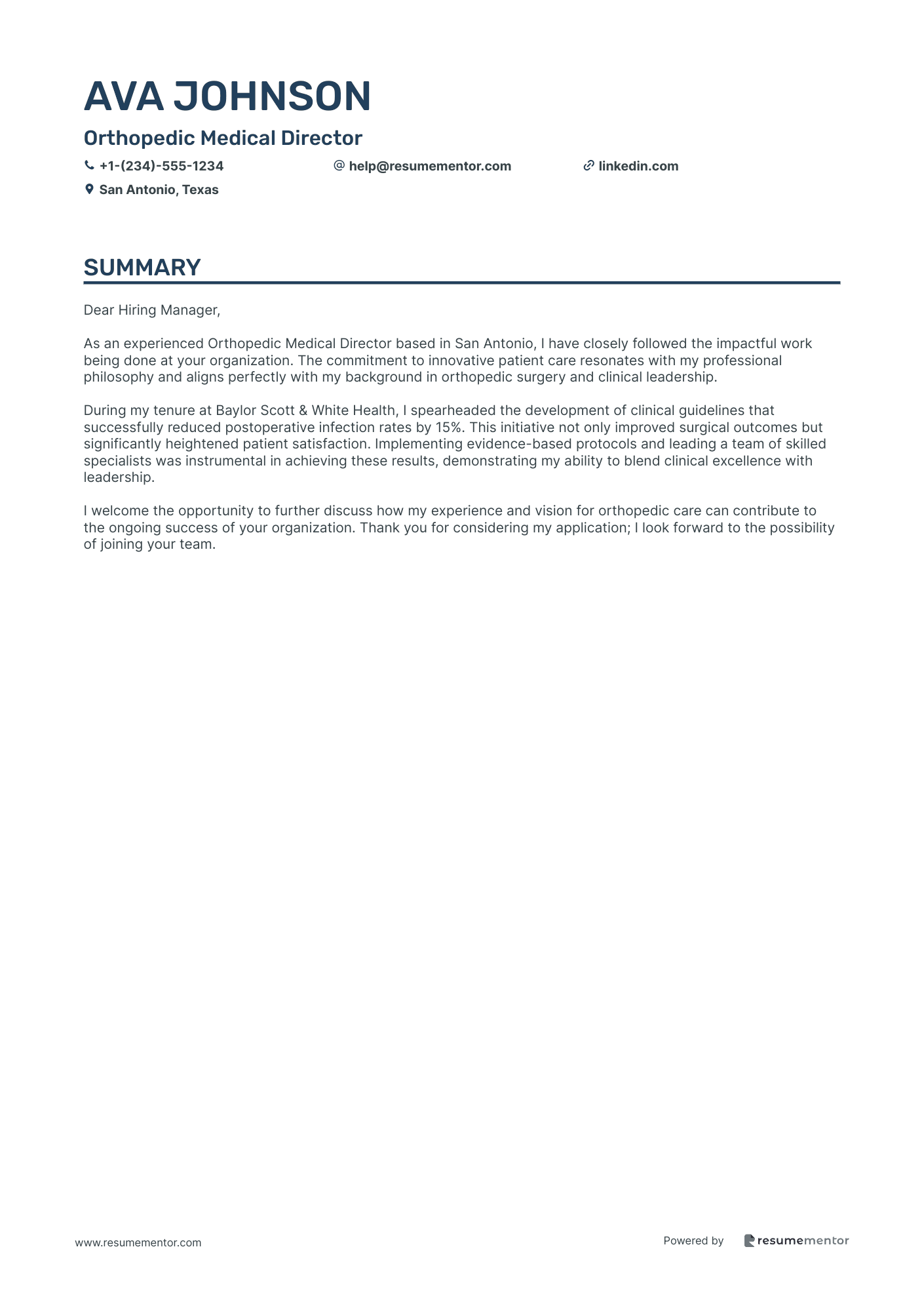
Orthopedic Medical Director
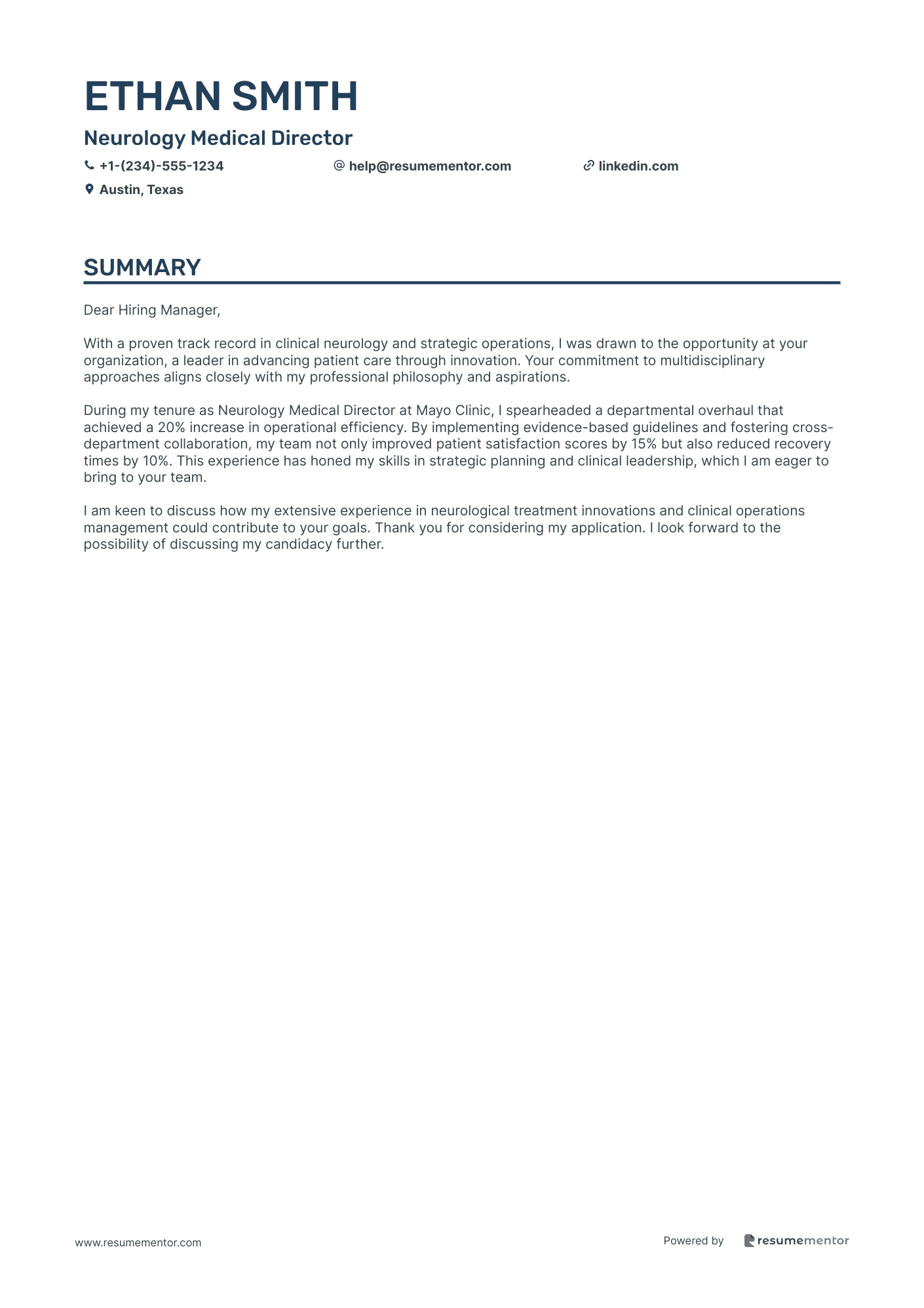
Neurology Medical Director
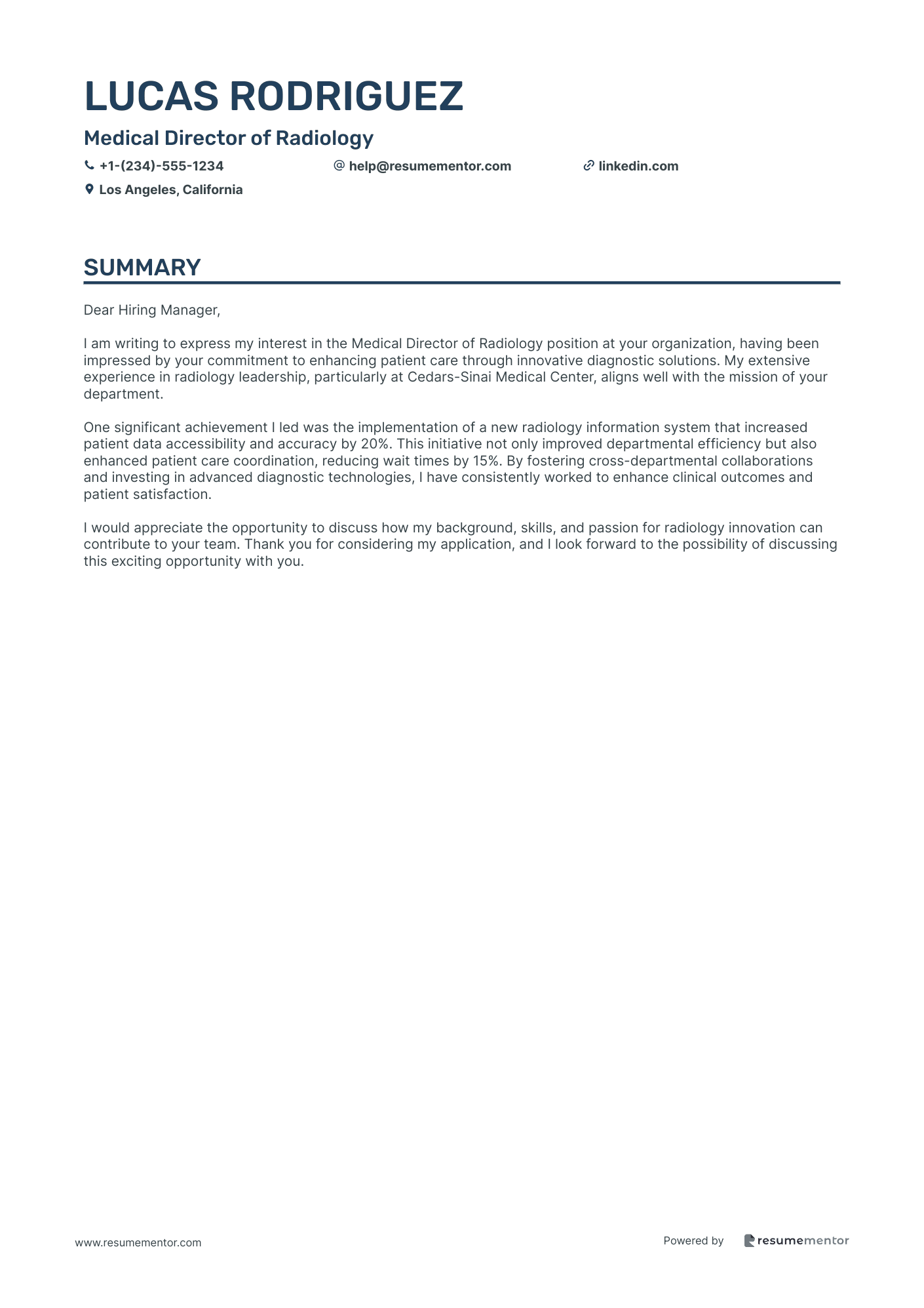
Medical Director of Radiology
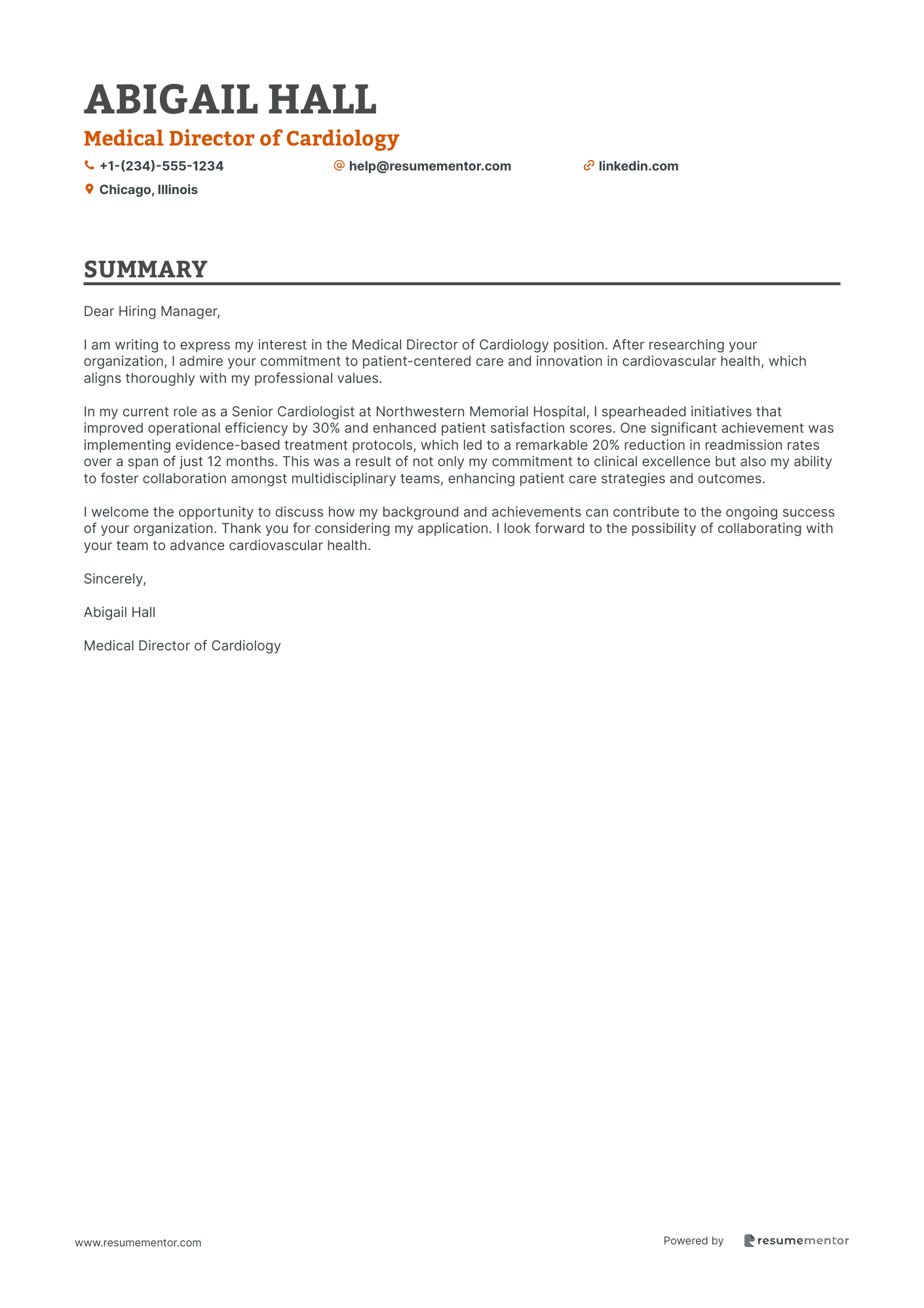
Medical Director of Cardiology

Pediatric Medical Director cover letter sample
When applying for this position, it’s important to showcase any previous leadership roles in pediatric settings. Highlight your clinical expertise in child health, including any specialized training or fellowships. If you have developed programs that improved patient outcomes or engagement, detail these experiences. Emphasize your ability to collaborate with multidisciplinary teams and communicate effectively with families. Finally, provide metrics that demonstrate your impact, such as improved patient satisfaction scores, to make your application compelling and results-oriented.
Scarlett Anderson
Pediatric Medical Director
Summary
Dear Hiring Manager,
With over 15 years of experience in pediatrics, I am drawn to the opportunity to contribute to your organization, especially given your commitment to innovative pediatric care and community health advocacy. I admire how your team prioritizes patient-centered approaches, which aligns with my professional goals.
At UCSF Benioff Children's Hospital, I spearheaded a comprehensive quality improvement program that resulted in a remarkable 30% increase in patient satisfaction scores within just two years. By leading a multidisciplinary team and fostering a culture of collaboration, I was able to enhance care plans for chronic conditions, ultimately driving better health outcomes for our pediatric patients.
I would welcome the opportunity to discuss how my experience in leading pediatric initiatives and developing tailored patient management strategies can further the mission of your organization. Thank you for your time and consideration, and I look forward to the possibility of contributing to your team.
Sincerely,
Scarlett Anderson
Pediatric Medical Director
Clinical Research Medical Director cover letter sample
In your cover letter, emphasize your experience in developing and managing clinical trials. Highlight your expertise in regulatory compliance and ethical standards, as these are critical for the role. Mention any relevant certifications, such as Clinical Research Associate or Good Clinical Practice. Utilize examples of successful projects where your leadership improved trial outcomes or streamlined processes. Showcase your ability to collaborate with cross-functional teams and communicate findings to stakeholders. This will demonstrate your capability to drive results and enhance the organization's research efforts.
Andrew Green
Clinical Research Medical Director
Summary
Dear Hiring Manager,
I was drawn to the opportunity at your organization due to your commitment to advancing healthcare through innovative clinical research processes. The alignment between your values and my dedication to improving patient outcomes in clinical trials makes this a natural fit.
During my tenure as Clinical Research Medical Director at Pfizer, I led medical oversight for 15 global clinical trials, achieving a 30% reduction in trial timelines by optimizing processes and enhancing cross-functional collaboration. This not only expedited patient access to critical therapies but also demonstrated my capability to manage complex projects effectively while ensuring compliance with regulatory standards.
I welcome the chance to further discuss how my experience can contribute to your team’s success. Thank you for considering my application; I look forward to the opportunity for an interview.
Sincerely,
Andrew Green
Medical Director of Oncology cover letter sample
When applying for this role, prioritize highlighting your experience in oncology treatments and clinical trials. Showcase any leadership roles you've held, emphasizing your ability to manage multidisciplinary teams effectively. Include details about your involvement in research studies, particularly any that led to significant advancements in patient care. Mention certifications or ongoing education relevant to oncology. Use specific examples of how your decisions improved patient outcomes or streamlined treatment processes, illustrating the impact through a 'skill-action-result' framework to strengthen your application.
Anthony Harris
Medical Director of Oncology
Summary
Dear Hiring Manager,
I am writing to express my interest in the Medical Director of Oncology position, as I have closely followed Cedars-Sinai Medical Center's innovations in cancer care and its emphasis on patient outcomes. Your commitment to quality improvement resonates with my professional philosophy and aligns perfectly with my experience in leading oncology departments.
During my tenure as Medical Director at Cedars-Sinai Medical Center, I spearheaded a comprehensive initiative that resulted in a remarkable 30% increase in clinical trial enrollment within two years. This achievement not only showcased my leadership capabilities in clinical trials management but also emphasized my strong relationships with multidisciplinary teams and referring physicians, significantly enhancing patient continuity of care.
I would appreciate the opportunity to further discuss how my background and proven results can contribute to the ongoing success of Cedars-Sinai Medical Center. Thank you for considering my application; I look forward to the possibility of an interview to explore this exciting opportunity.
Sincerely,
Anthony Harris
Hospice and Palliative Care Medical Director cover letter sample
When crafting your cover letter, showcase your experience in managing complex care for patients with serious illnesses. Emphasize your leadership in interdisciplinary teams and your ability to improve patient outcomes. Highlight any specialized training in palliative care or hospice practices. Detail your approach to family communication and support, and provide examples of how you've enhanced care delivery. Use the 'skill-action-result' format to illustrate your contributions, such as reducing hospital readmissions or increasing patient satisfaction scores through innovative programs.
Luke Adams
Hospice and Palliative Care Medical Director
Summary
Dear Hiring Manager,
I am writing to express my interest in the Hospice and Palliative Care Medical Director position. Having researched your organization, I am impressed by your commitment to patient-centered care and community engagement, which aligns perfectly with my professional values.
In my tenure as Palliative Care Medical Director at VITAS Healthcare in Jacksonville, I led a multidisciplinary team to enhance the overall quality of patient care. A key achievement during this time was the implementation of evidence-based care protocols that resulted in a 25% reduction in hospital readmission rates within six months. This not only improved patient outcomes but also significantly raised patient satisfaction scores by 15%, showcasing my ability to drive meaningful change in healthcare settings.
I would welcome the opportunity to discuss how my background in hospice and palliative care can be beneficial for your organization. Thank you for considering my application, and I look forward to the possibility of interviewing to further explore this exciting opportunity.
Psychiatric Medical Director cover letter sample
When applying for this role, it's essential to showcase your clinical experience in mental health settings. Highlight any leadership roles you've held, emphasizing your ability to manage and mentor a diverse team. Certifications in psychiatry, addiction medicine, or advanced mental health are important to mention. Use specific examples where your clinical decisions led to improved patient outcomes or streamlined processes. Applying a 'skill-action-result' format can demonstrate your impact, showing how you’ve contributed to patient care and enhanced the overall mental health services.
Joshua Nelson
Psychiatric Medical Director
Summary
Dear Hiring Manager,
Having researched Acadia Healthcare and its commitment to improving mental health care through innovative practices, I am eager to contribute my 10+ years of experience in psychiatry as your next Psychiatric Medical Director.
At Acadia Healthcare, I spearheaded the integration of a new Electronic Health Record (EHR) system, which improved record accuracy and accessibility by 50%. This initiative not only enhanced patient care but also fostered better collaboration among the multidisciplinary team, leading to a 30% increase in patient satisfaction scores. Such achievements reflect my ability to lead and innovate in high-pressure environments while always keeping patient care as a priority.
I welcome the opportunity to discuss how my leadership and dedication to mental health can positively impact your team. Thank you for considering my application; I look forward to the possibility of an interview to further explore how I can contribute to Acadia Healthcare's mission.
Emergency Medicine Medical Director cover letter sample
When crafting your cover letter, emphasize your leadership experience within emergency departments. Highlight any involvement in developing protocols or improving patient outcomes. Detail your familiarity with regulatory compliance and quality assurance measures. Include specific metrics that showcase how your initiatives reduced wait times or increased patient satisfaction. If you've led training programs for staff or implemented new technologies, mention these contributions. Use the 'skill-action-result' format to illustrate the direct impact of your efforts on team performance and patient care.
Liam Johnson
Emergency Medicine Medical Director
Summary
Dear Hiring Manager,
I am writing to express my interest in the Emergency Medicine Medical Director position at your esteemed institution. I have researched your commitment to quality patient care and dedication to community health, which aligns perfectly with my professional values and aspirations.
In my current role at Baylor Scott & White Health, I led a team of over 30 medical professionals to improve emergency department throughput by 20% in just one year. This achievement was driven by my focus on strategic planning and developing efficient clinical protocols, ultimately enhancing both patient care and staff satisfaction. By implementing targeted initiatives, I was able to significantly reduce patient wait times and increase overall department efficiency.
I would welcome the opportunity to discuss how my experience and leadership skills can contribute to the goals of your organization. Thank you for considering my application; I look forward to the possibility of an interview.
Sincerely,
Liam Johnson
Emergency Medicine Medical Director
Orthopedic Medical Director cover letter sample
When applying for this leadership role, it's essential to highlight your extensive clinical experience in orthopedic surgery. Emphasize your ability to develop and oversee treatment protocols that improve patient outcomes. Showcase any leadership roles in medical committees or quality improvement initiatives, as these demonstrate your commitment to enhancing healthcare delivery. Include any advanced certifications, like board certification in orthopedics or fellowship training. Use specific examples to illustrate how your decisions led to improved patient satisfaction or reduced surgical complications, adhering to a 'skill-action-result' framework.
Ava Johnson
Orthopedic Medical Director
Summary
Dear Hiring Manager,
As an experienced Orthopedic Medical Director based in San Antonio, I have closely followed the impactful work being done at your organization. The commitment to innovative patient care resonates with my professional philosophy and aligns perfectly with my background in orthopedic surgery and clinical leadership.
During my tenure at Baylor Scott & White Health, I spearheaded the development of clinical guidelines that successfully reduced postoperative infection rates by 15%. This initiative not only improved surgical outcomes but significantly heightened patient satisfaction. Implementing evidence-based protocols and leading a team of skilled specialists was instrumental in achieving these results, demonstrating my ability to blend clinical excellence with leadership.
I welcome the opportunity to further discuss how my experience and vision for orthopedic care can contribute to the ongoing success of your organization. Thank you for considering my application; I look forward to the possibility of joining your team.
Neurology Medical Director cover letter sample
When applying for this position, highlight your clinical experience in neurology, particularly any leadership roles you've held. Emphasize your ability to develop treatment protocols and manage patient care teams effectively. If you have published research or contributed to clinical trials, ensure to mention this in your cover letter. Include any specific certifications like board certifications in neurology or fellowships that bolster your qualifications. Demonstrating your collaborative skills in multidisciplinary teams will also show your value and potential impact on patient outcomes and departmental goals.
Ethan Smith
Neurology Medical Director
Summary
Dear Hiring Manager,
With a proven track record in clinical neurology and strategic operations, I was drawn to the opportunity at your organization, a leader in advancing patient care through innovation. Your commitment to multidisciplinary approaches aligns closely with my professional philosophy and aspirations.
During my tenure as Neurology Medical Director at Mayo Clinic, I spearheaded a departmental overhaul that achieved a 20% increase in operational efficiency. By implementing evidence-based guidelines and fostering cross-department collaboration, my team not only improved patient satisfaction scores by 15% but also reduced recovery times by 10%. This experience has honed my skills in strategic planning and clinical leadership, which I am eager to bring to your team.
I am keen to discuss how my extensive experience in neurological treatment innovations and clinical operations management could contribute to your goals. Thank you for considering my application. I look forward to the possibility of discussing my candidacy further.
Medical Director of Radiology cover letter sample
When crafting your cover letter, focus on your leadership in radiology and any previous management roles you have held. Highlight your experience with diagnostic imaging technologies and your ability to work with cross-functional teams. Mention any relevant certifications, such as board certification in radiology, and detail any continued education courses you’ve taken to stay current. Include specific instances where your strategic decisions improved patient outcomes or operational efficiency, using the 'skill-action-result' method to showcase your impact effectively.
Lucas Rodriguez
Medical Director of Radiology
Summary
Dear Hiring Manager,
I am writing to express my interest in the Medical Director of Radiology position at your organization, having been impressed by your commitment to enhancing patient care through innovative diagnostic solutions. My extensive experience in radiology leadership, particularly at Cedars-Sinai Medical Center, aligns well with the mission of your department.
One significant achievement I led was the implementation of a new radiology information system that increased patient data accessibility and accuracy by 20%. This initiative not only improved departmental efficiency but also enhanced patient care coordination, reducing wait times by 15%. By fostering cross-departmental collaborations and investing in advanced diagnostic technologies, I have consistently worked to enhance clinical outcomes and patient satisfaction.
I would appreciate the opportunity to discuss how my background, skills, and passion for radiology innovation can contribute to your team. Thank you for considering my application, and I look forward to the possibility of discussing this exciting opportunity with you.
Medical Director of Cardiology cover letter sample
When crafting your cover letter, emphasize your extensive clinical experience in cardiology and any leadership roles you have held. Highlight your ability to develop and implement treatment protocols, showcasing how they improved patient outcomes. Include your experience in managing a team, illustrating effective collaboration and mentoring. Mention any research contributions or publications in cardiology, as these demonstrate your commitment to advancing the field. Finally, provide specific examples of how your decisions have positively impacted department performance or patient satisfaction, using a clear 'skill-action-result' framework.
Abigail Hall
Medical Director of Cardiology
Summary
Dear Hiring Manager,
I am writing to express my interest in the Medical Director of Cardiology position. After researching your organization, I admire your commitment to patient-centered care and innovation in cardiovascular health, which aligns thoroughly with my professional values.
In my current role as a Senior Cardiologist at Northwestern Memorial Hospital, I spearheaded initiatives that improved operational efficiency by 30% and enhanced patient satisfaction scores. One significant achievement was implementing evidence-based treatment protocols, which led to a remarkable 20% reduction in readmission rates over a span of just 12 months. This was a result of not only my commitment to clinical excellence but also my ability to foster collaboration amongst multidisciplinary teams, enhancing patient care strategies and outcomes.
I welcome the opportunity to discuss how my background and achievements can contribute to the ongoing success of your organization. Thank you for considering my application. I look forward to the possibility of collaborating with your team to advance cardiovascular health.
Sincerely,
Abigail Hall
Medical Director of Cardiology
Related Articles

Continue Reading
Check more recommended readings to get the job of your dreams.
Resume
Resources
Tools
© 2026. All rights reserved.
Made with love by people who care.
